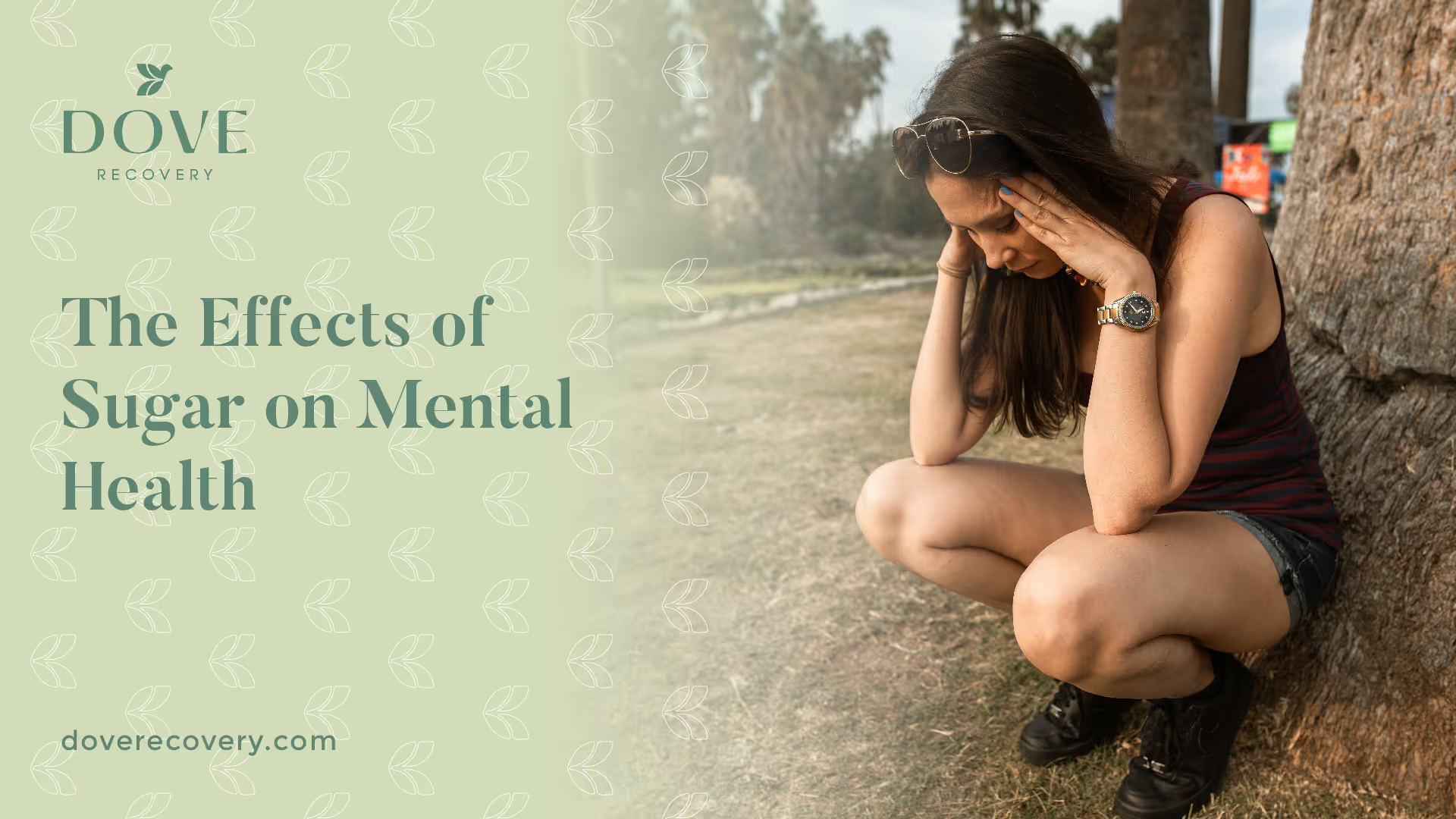Is Sugar Addictive? Causes, Symptoms, And Effects

Is Sugar Addictive? The Answer May Surprise You
Sugar is a staple in the modern diet. From the sweet treats we indulge in to the sugar-laden drinks we consume, sugar is everywhere. However, there has been a growing concern about whether sugar is addictive, and if so, what it means for our health. In this article, we'll explore the science behind sugar addiction and whether it's a real phenomenon or just a myth.
What is Sugar Addiction?

First, let's define what we mean by sugar addiction. Sugar addiction is typically characterized by compulsive behavior, continued use despite negative consequences, and withdrawal symptoms when use is stopped. It's not hard to see why some people might label sugar as addictive. After all, consuming sugar can lead to a pleasurable feeling, and many of us find it hard to stop at just one sugary snack.
However, the scientific evidence for sugar addiction is mixed. Some studies suggest that sugar activates the same reward centers in the brain as drugs like cocaine and heroin, leading to a cycle of cravings and consumption. Other studies suggest that sugar doesn't meet the criteria for addiction, and that labeling it as such may be oversimplifying the issue.
The Role of Sugar in Brain Function and Mood Regulation
Although the debate about whether sugar addiction is a real phenomenon or not remains ongoing, it is clear that sugar does play a significant role in brain function and mood regulation. Here are some examples:
Dopamine release
Consuming sugar triggers the release of dopamine, a neurotransmitter associated with pleasure and reward. This can lead to feelings of euphoria and heightened energy levels.
Sugar crashes
Unfortunately, the boost from sugar is short-lived, and when blood sugar levels drop, we can experience a crash in mood and energy. This crash can lead to cravings for more sugar as our bodies try to regain that pleasurable feeling.
Impaired cognitive function
Excessive consumption of sugar has been linked to impaired cognitive function and memory loss. In one study, rats fed a high-sugar diet performed worse on memory tests than those on a regular diet.
Chronic inflammation
Consuming too much sugar can lead to chronic inflammation in the brain, which has been linked to depression and other mood disorders. Inflammation is also associated with a higher risk of developing Alzheimer's disease.
While some experts argue that the evidence for sugar addiction is mixed, there is no denying that our consumption of sugar can have a significant impact on our brain function and mood regulation. It's important to be mindful of our sugar intake and strive for balance in our diets.
Sugar Addiction Symptoms
While the scientific evidence for sugar addiction is not yet conclusive, some experts believe that sugar can be addictive for some people. Here are some symptoms that may indicate a possible addiction to sugar:
Cravings
Feeling intense cravings for sugary foods or drinks, even when not hungry.
Loss of control
Eating more sugar than intended and feeling unable to stop.
Withdrawal symptoms
Feeling irritable, anxious, or fatigued when trying to cut back on sugar.
Continued use despite negative consequences
Consuming sugar even when it leads to weight gain, health problems, or other negative outcomes.
Difficulty quitting
Feeling unable or unwilling to quit eating sugary foods or drinks.
It's important to note that experiencing one or more of these symptoms does not necessarily mean that someone has a sugar addiction. However, if you find yourself struggling with these symptoms and feel that your consumption of sugar is impacting your life negatively, it may be worth speaking with a healthcare professional for support.
Negative Health Consequences of Sugar
It is well-established that excessive sugar consumption can have negative health consequences. Here are some examples:
Obesity
Consuming too much sugar can contribute to weight gain and obesity. In fact, studies have found that people who consume sugary drinks or foods have a higher risk of becoming overweight or obese.
Type 2 diabetes
High sugar intake has been linked to an increased risk of developing type 2 diabetes. One study found that people who consumed the most sugar had a 30% higher risk of developing the condition than those who consumed the least.
Heart disease
Excessive sugar consumption has also been linked to an increased risk of heart disease. A review of studies found that consuming more than 10% of daily calories from added sugars was associated with a higher risk of dying from heart disease.
Other health problems
In addition to these health problems, excessive sugar intake has been linked to other health issues such as tooth decay, fatty liver disease, and certain types of cancer.
While it's not entirely clear whether these negative outcomes are due to sugar addiction or simply a result of consuming too many calories from sugar, it is clear that reducing our sugar intake can have significant health benefits. It's important to be mindful of our sugar intake and strive for balance in our diets.
The Effects of Sugar on Mental Health

While it's clear that consuming too much sugar can have negative effects on physical health, the impact of sugar on mental health is less well-understood. However, some studies suggest that there may be a link between excessive sugar consumption and an increased risk of anxiety and depression.
Anxiety
Research has found that high sugar intake may be associated with an increased risk of anxiety. One study found that people who consumed more than 67 grams of sugar per day were more likely to experience symptoms of anxiety than those who consumed less than 40 grams per day. Another study found that people who drank sugary beverages regularly had a higher risk of developing generalized anxiety disorder.
Depression
The relationship between sugar consumption and depression is complex and not yet fully understood. Some studies suggest that high sugar intake may increase the risk of developing depression, while others have found no association. However, there is evidence to suggest that a diet high in added sugars may contribute to inflammation in the body, which has been linked to an increased risk of depression.
It's worth noting that while these studies provide some insight into the potential link between sugar and mental health, they do not prove causation. It's possible that other factors, such as lifestyle habits or pre-existing mental health conditions, may play a role in this relationship.
How to Break Sugar Addiction?
Breaking sugar addiction can be a difficult task, but it's not impossible. Here are some tips that may help you break free from your sugar cravings:
Gradually reduce your sugar intake
Going cold turkey on sugar can be challenging, so try gradually reducing your intake instead. Start by cutting back on sugary drinks and snacks and replacing them with healthier alternatives like water and fresh fruits.
Read food labels
Many processed foods contain hidden sources of added sugars, so it's important to read food labels carefully when grocery shopping. Look for ingredients like high-fructose corn syrup, dextrose, and sucrose, which are all forms of added sugar.
Get plenty of sleep
Lack of sleep has been linked to increased cravings for sugary foods, so make sure you're getting enough rest each night.
Eat a balanced diet
Eating a balanced diet with plenty of protein, healthy fats, and fiber can help keep you feeling full and reduce your cravings for sugar.
Stay hydrated
Drinking plenty of water throughout the day can help curb your appetite and reduce your cravings for sugary drinks.
Find alternative ways to cope with stress
Many people turn to sugary foods as a way to cope with stress or emotional issues. Finding alternative ways to manage stress like exercise or meditation can help reduce the need for sugary comfort foods.
By following these tips and being mindful of your sugar intake, you can break free from your sugar addiction and improve your overall health.
So, what does all of this mean for you and your diet? It's important to keep in mind that sugar, like most things, is fine in moderation. Enjoying a sugary treat every now and then is unlikely to cause any harm. However, if you find yourself struggling to control your sugar intake and experiencing negative consequences as a result, it may be time to reevaluate your relationship with sugar.
What is the Safe Level of Sugar Consumption?
While sugar can be enjoyed in moderation, it's important to be mindful of our intake and strive for balance in our diets. But what exactly does that mean when it comes to sugar consumption? The American Heart Association recommends limiting added sugars to no more than 6 teaspoons per day for women and 9 teaspoons per day for men. To put that into perspective, a single can of soda can contain up to 10 teaspoons of added sugar!
It's also worth noting that not all sugars are created equal. Natural sugars found in fruits and vegetables are generally considered healthier than added sugars found in processed foods and drinks. When possible, opt for whole foods over processed options, and aim to get your sweet fix from natural sources like fresh berries or a piece of fruit.
Ultimately, the safe level of sugar consumption will vary based on individual factors such as age, activity level, and overall health status. However, by being mindful of our intake and choosing healthier options whenever possible, we can work towards reducing our risk of negative health outcomes associated with excessive sugar consumption.
What Is The Root Cause of Sugar Addiction?

While the scientific evidence for sugar addiction is still evolving, some researchers believe that the root cause of sugar addiction may be related to our brain's reward system. Here are some examples:
Dopamine release
Consuming sugar triggers the release of dopamine, a neurotransmitter associated with pleasure and reward. Over time, our brains may become desensitized to the effects of dopamine, leading us to consume more sugar in order to achieve the same pleasurable feeling. This cycle of consumption and desensitization can lead to a pattern of addiction.
Stress relief
Another potential factor in sugar addiction is stress. Many people turn to sugary foods as a way to cope with stress or emotional issues. The temporary relief provided by sugar can become a habit, leading to cravings and continued use despite negative consequences. This is often referred to as emotional eating.
It's worth noting that not everyone who consumes sugar will develop an addiction, and there are likely multiple factors at play when it comes to why some individuals may be more susceptible than others. However, by understanding the potential root causes of sugar addiction and being mindful of our intake, we can work towards reducing our risk of negative health outcomes associated with excessive sugar consumption.
How to Cope with Sugar Addiction?
Breaking free from a sugar addiction can be challenging, but it's not impossible. Here are some additional tips that may help you cope with your sugar addiction:
Identify triggers and develop a plan
Identifying the triggers that lead to your sugar cravings can be helpful in developing a plan to cope with them. For example, if stress is a trigger for you, finding alternative ways to manage stress like exercise or meditation can help reduce the need for sugary comfort foods.
Practice mindfulness
Practicing mindfulness techniques like deep breathing or meditation can help you become more aware of your thoughts and feelings around sugar cravings. This increased awareness can help you develop healthier coping strategies.
Seek support
Seeking support from friends, family, or a healthcare professional can also be helpful in coping with a sugar addiction. A support system can provide encouragement, accountability, and resources for managing cravings and reducing intake.
Celebrate successes
Breaking free from a sugar addiction is an accomplishment worth celebrating! Recognize and celebrate your successes along the way, whether it's going a day without added sugars or making healthier choices at mealtime.
By implementing these coping strategies and seeking support when needed, you can successfully manage your sugar addiction and improve your overall health and well-being.
Conclusion
In conclusion, the debate about whether sugar addiction is a real phenomenon or not remains ongoing, but it is clear that excessive sugar consumption can have negative health consequences. While some people may be more susceptible to developing an addiction to sugar than others, it's important for all of us to be mindful of our sugar intake and strive for balance in our diets.
Remember that enjoying a sugary treat every now and then is unlikely to cause any harm. However, if you find yourself struggling to control your sugar intake and experiencing negative consequences as a result, it may be time to reevaluate your relationship with sugar.
By making small changes to our diets and being mindful of our intake, we can work towards reducing our risk of negative health outcomes associated with excessive sugar consumption.
